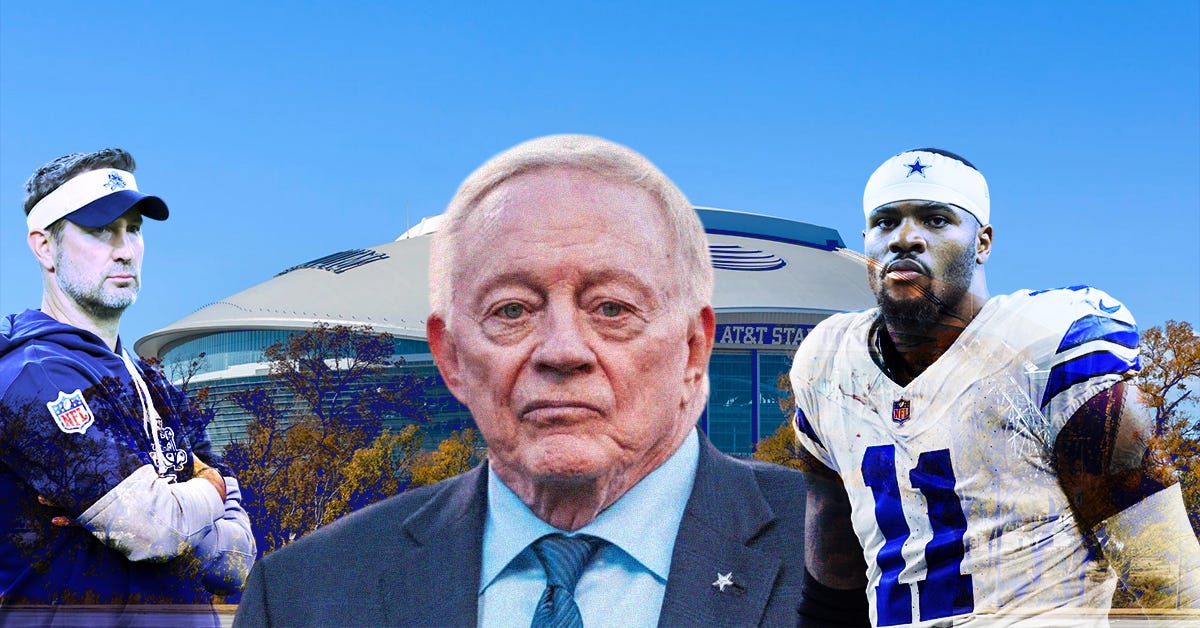Egos are Bigger in Texas: Micah Parsons and The Downfall of NFL Owners
The Biggest Difference Between Teams That Win and Teams That Don't
Jerry Jones is on one. At times, it’s easy to look at the billionaire owner of the Dallas Cowboys as a classic TV villain. The oil tycoon who moves heaven and earth to get his way. But for a while there, TV villain Jerry Jones hasn’t knocked the Cowboys significantly off their perch as regular-season darlings.
Despite public feuds with Hall-of-Fame coaches, puzzling hires, and tenuous negotiations with superstars like Dak Prescott and Ceedee Lamb, Jerry’s team has usually weathered the storm. But mistakes have a way of catching up with you. And the culmination of Jerry’s sins has arrived in the form of a disgruntled 26-year-old superstar.
As an Eagles fan, I couldn’t be more excited about the Micah Parsons trade to the Green Bay Packers. Yes, that strengthens the Packers’ case to win the NFC, but my hate for the Cowboys is that strong.
Parsons is a world-destroying edge rusher whose gravity can swallow entire offenses whole. He is the epitome of a modern defensive superstar in a league that craves his singular skill set. Parsons is a generational player right now. He was the backbone of an evolving Cowboys defense that is prone to falling apart without him. Those are the players you throw draft picks into the wishing well for. Those are the players you pay no matter what.
The most important aspect of the Parons trade is that it could’ve been avoided. Like Jerry Jones, many NFL owners fail to understand one of the main lessons competition has to offer. In a league entrenched in impermanence and parity, stability usually wins. The teams that have found a winning approach and stuck to it continue to succeed in the long term.
The last five teams to win a Super Bowl - Eagles, Chiefs, Rams, Buccaneers, and Patriots - have all been models of stability. At the time of winning (and mostly to this day), each of those teams had an owner who built a long-term stable front office structure with a concrete vision. Each owner also allowed said front office to follow through on that vision without getting overly involved. Each team established stability in the front office, coaching staff, and the quarterback position.
That fosters accountability, collaboration, and freedom to fail. Each team (including the Patriots at the time) had a long-tenured General Manager whose job security allowed them to take risks without fear of being fired and to work collaboratively with ownership. Each team is known for taking care of its core players, understanding their importance as scheme and culture-setters. Even a coaching change with an organization like the Bucs involved handing the reins to a talented coach already on their staff.
This is what excellence looks like. Stable forces in an unstable environment that are given the space and time to manifest a vision and create a winning culture.
The Cowboys have not been to the Super Bowl in 29 years. In that time, they’ve won 5 playoff games and have lost 13. America’s Team is closer to the Cleveland Browns of the world than the upper echelon of the NFL.
And that’s because the main differentiator among teams in the NFL is ownership. More specifically, the owner’s ego.
Jimmy Haslam thought he knew what no one else did when he pushed his front office to acquire Deshaun Watson. A decision that set Cleveland back for a generation. For years, Indianapolis failed to invest resources into protecting Andrew Luck until his body broke down and he abruptly retired. A moment that leaves Indianapolis in QB purgatory 6 years later. The Jets created a constant carousel of coaches, general managers, and quarterbacks (a team’s three most influential positions), put all of their chips on a past-his-prime Aaron Rodgers, and had rumors of a 17-year-old calling the shots with their franchise.
In every instance, the owner is too far over his skates but doesn’t realize it. Their own ego absolves them of any blame or incurred consequences. Every owner with an outsized ego believes they know better than the experts they hired. Every egotistical owner wants the glory without the accountability. They want affirmation over conflict. And they will do whatever it takes, just shy of investing their own money, to get their way.
It’s well documented that Jerry Jones ignored Micah Parsons’ multiple requests to negotiate with his agent. We also know that Jerry waited until the last minute to pay Dak Prescott, Ceedee Lamb, and other foundational players in the past. We know that because he waited, his hand was forced to compensate those players with market-setting contracts, which ran the well dry when it was time to pay Micah.
And here we are. Unfortunately, the Dallas Cowboys go as Jerry Jones goes. What keeps them in NFL purgatory is the unchecked ego of an owner who craves headlines over championships. This move isn’t just a schematic sinkhole for a new defensive coordinator in Matt Eberflus; it’s a cultural reset.
Jerry has seemingly provoked one of the NFL’s most powerful agents. Players will see what happened with Micah and wonder if they’ll be treated accordingly. The star has lost a little luster. I, for one, could not be happier.
I wonder when NFL owners will learn their lesson. As Pat Riley once said, “Until you change the way that you look at things, those things will never change.”




